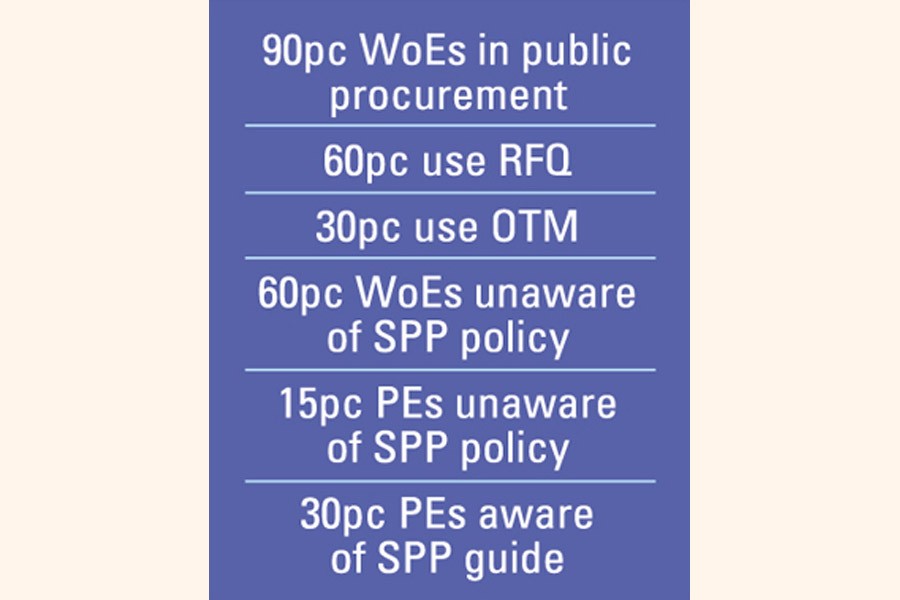
Published :
Updated :

Lack of awareness of Sustainable Public Procurement (SPP) and the absence of a concrete action plan are hindering long-term development goals, causing inefficiencies, and sidelining women entrepreneurs, according to a recent survey and stakeholders' observations.
To ensure effective implementation of the SPP policy, they recommended structural reforms in Bangladesh Public Procurement Authority (BPPA) and procuring entities, along with capacity building for both officials and women-owned businesses.
These findings and recommendations were shared at a policy dialogue on Bangladesh's SPP Policy held at a city hotel on Thursday.
Ferdaus Ara Begum, CEO of BUILD, presented the study findings highlighting some specific requirements for WoEs to be in business and their participation in public procurement activities.
The survey report recommended forming a taskforce comprising the BPPA and procuring entities, and holding a series of inter-agency meetings or dialogues to develop an action plan with concrete timelines and targets for implementing the SPP policy. The action plan should be aligned with the SPP guide.
The survey findings also reveal that 90 per cent of surveyed Women Owned Enterprises (WOEs) participate in public procurement, of which 60 per cent favoring the simpler Request for Quotation (RFQ) method, and only 30 per cent using the more complex Open Tendering Method (OTM).
It revealed a significant lack of SPP Policy awareness among WOEs (60 per cent) and procuring entities (15 per cent), while regarding the SPP guide, 30 per cent of PEs are aware about it.
BUILD in collaboration with International Trade Centre (ITC)'s She Trades Initiative and the Bangladesh Public Procurement Authority (BPPA) with the support from UK Foreign, Commonwealth and Development Office (FCDO) conducted the survey on SPP policy to identify Policy Implementation Challenges and Opportunities.
Mirza Ashfaqur Rahman, CEO of BPPA, said that while Bangladesh's public procurement system is not fully digitised, a major portion of procurement is now done through the e-GP (electronic Government Procurement) system.
He noted that the government is now focusing on implementing SPP to meet SDG target 12.7, which requires raising awareness among all stakeholders, including women entrepreneurs.
As part of this effort, BPPA is holding consultations with stakeholders and plans to pilot SPP implementation in six products identified in the SPP Policy approved in 2023.
Ms. Ma Diyina Gem Arbo, policy lead, SheTrades initiative, in her presentation, has highlighted a gender responsive monitoring and evaluation framework with a standard definition of women-owned business.
She underscored the need for women entrepreneurs to understand the gender provisions in the public procurement processes and their ways to navigate the process.
Abdus Sattar, project director of the Southern Chattogram Regional Development Project under the Local Government Engineering Department (LGED), said the government has not yet started implementing the SPP policy as some necessary tools are still being prepared.
sajibur@gmail.com


 For all latest news, follow The Financial Express Google News channel.
For all latest news, follow The Financial Express Google News channel.